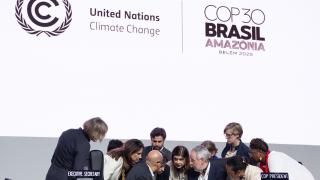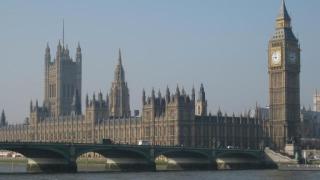Côte d'Ivoire president Laurent Gbagbo has agreed to negotiate a “peaceful end” to his country's crisis without preconditions, regional leaders say.
The chairman of the ECOWAS regional group said Mr Gbagbo had also agreed to immediately lift the blockade around the temporary headquarters of his presidential rival Alassane Ouattara. Many however have highlighted that Gbagbo has given no indication that he is willing to give up power and that the situation remains tense, with soldiers attacking the headquarters of the PDCI opposition party which supports the election victor, Alassane Quattara. Mr Quattara himself remains under UN protection in a hotel in Abidjan
The UN High Commissioner for Human Rights, Navi Pillay, has written individually to a group of leaders in key authority positions in Côte d'Ivoire to remind them in the strongest terms that they will be held personally responsible and accountable for human rights violations resulting from their actions and/or omissions, according to international human rights and humanitarian law. “The international criminal justice system that has developed over the past fifteen or so years has given us a tool of accountability we did not have before,” Ms. Pillay said announcing the communications on 4 January 2011. “No longer can heads of state, and other actors, be sure that they can commit atrocious violations and get away with it.”
The UN human rights chief reiterated her strong concern that the deteriorating security conditions in the country and the interference with the UN Office in Côte d'Ivoire (UNOCI) continue to block the investigation of a large number of human rights violations reported.
“We have received reports of at least two mass graves; however, UN human rights teams have been denied access to the scenes of these atrocities in order to investigate them,” Ms. Pillay said. “Denying access to alleged mass grave sites and places where the victims’ mortal remains are allegedly deposited constitutes a clear violation of international human rights and humanitarian law.”
Meanwhile UNHCR has been strengthening its contingency arrangements for Côte d'Ivoire in light of the continuing instability. As of 21 December alone, the number of Ivorians having fled westwards into Liberia and Guinea stood at around 6,200. Of this total, 6,000 are in the Nimba County area of eastern Liberia with the rest in Guinea. Most are women and children seeking protective refuge and, thus far, only a handful of those in Liberia have reported actual beatings.
Speaking to journalists in Geneva, UNHCR spokesman Adrian Edwards described how “…we airlifted additional supplies to Liberia and Guinea from our emergency stockpile in Copenhagen...we currently stand ready to cope with the needs of up to 30,000 refugees.”
NGOs working in northeastern Liberia say many of the 30,000 refugees arriving from neighbouring Côte d’Ivoire are reporting widespread violence and intimidation from both Ivoirian government troops and soldiers from the former rebel Forces Nouvelles (New Forces) operating in the west. On 2 January 2011, Secretary-General Ban Ki-moon reaffirmed the United Nations’ “principled and unwavering” stand that the outcome of the recent presidential election in Côte d'Ivoire reflected the will of the people and the result must therefore be upheld.
Côte d'Ivoire president Laurent Gbagbo has agreed to negotiate a “peaceful end” to his country's crisis without preconditions, regional leaders say.
The chairman of the ECOWAS regional group said Mr Gbagbo had also agreed to immediately lift the blockade around the temporary headquarters of his presidential rival Alassane Ouattara. Many however have highlighted that Gbagbo has given no indication that he is willing to give up power and that the situation remains tense, with soldiers attacking the headquarters of the PDCI opposition party which supports the election victor, Alassane Quattara. Mr Quattara himself remains under UN protection in a hotel in Abidjan
The UN High Commissioner for Human Rights, Navi Pillay, has written individually to a group of leaders in key authority positions in Côte d'Ivoire to remind them in the strongest terms that they will be held personally responsible and accountable for human rights violations resulting from their actions and/or omissions, according to international human rights and humanitarian law. “The international criminal justice system that has developed over the past fifteen or so years has given us a tool of accountability we did not have before,” Ms. Pillay said announcing the communications on 4 January 2011. “No longer can heads of state, and other actors, be sure that they can commit atrocious violations and get away with it.”
The UN human rights chief reiterated her strong concern that the deteriorating security conditions in the country and the interference with the UN Office in Côte d'Ivoire (UNOCI) continue to block the investigation of a large number of human rights violations reported.
“We have received reports of at least two mass graves; however, UN human rights teams have been denied access to the scenes of these atrocities in order to investigate them,” Ms. Pillay said. “Denying access to alleged mass grave sites and places where the victims’ mortal remains are allegedly deposited constitutes a clear violation of international human rights and humanitarian law.”
Meanwhile UNHCR has been strengthening its contingency arrangements for Côte d'Ivoire in light of the continuing instability. As of 21 December alone, the number of Ivorians having fled westwards into Liberia and Guinea stood at around 6,200. Of this total, 6,000 are in the Nimba County area of eastern Liberia with the rest in Guinea. Most are women and children seeking protective refuge and, thus far, only a handful of those in Liberia have reported actual beatings.
Speaking to journalists in Geneva, UNHCR spokesman Adrian Edwards described how “…we airlifted additional supplies to Liberia and Guinea from our emergency stockpile in Copenhagen...we currently stand ready to cope with the needs of up to 30,000 refugees.”
NGOs working in northeastern Liberia say many of the 30,000 refugees arriving from neighbouring Côte d’Ivoire are reporting widespread violence and intimidation from both Ivoirian government troops and soldiers from the former rebel Forces Nouvelles (New Forces) operating in the west. On 2 January 2011, Secretary-General Ban Ki-moon reaffirmed the United Nations’ “principled and unwavering” stand that the outcome of the recent presidential election in Côte d'Ivoire reflected the will of the people and the result must therefore be upheld.






